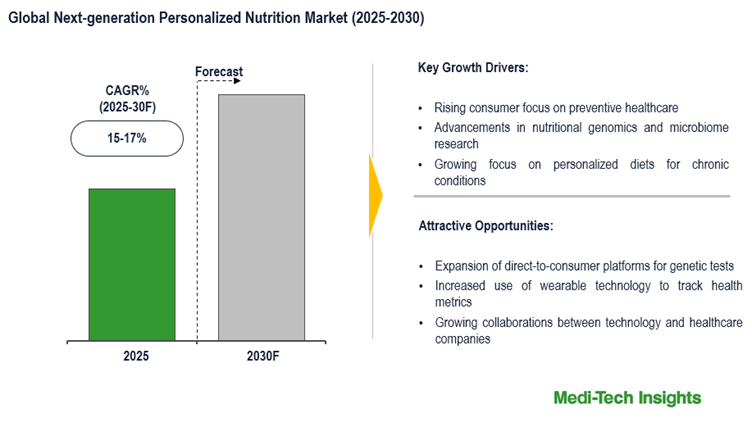Key Takeaways
- The next-generation personalized nutrition market is expected to grow at a CAGR of 15-17% from 2025 to 2030.
- Key growth factors include rising health awareness, advances in nutrigenomics, and integration of digital health technologies.
- Challenges such as high implementation costs and consumer education needs may hinder market growth.
Market Growth Overview
The next-generation personalized nutrition market is poised for substantial growth, with projections indicating a CAGR of 15-17% from 2025 to 2030. This expansion is driven by a heightened focus on health and wellness, notable advancements in nutrigenomics, and the rising prevalence of chronic diseases. Additionally, the incorporation of digital health technologies into nutrition solutions is expected to facilitate personalized dietary approaches. However, challenges like high implementation costs and the necessity for extensive consumer education may impede the market’s progress.
Next-generation personalized nutrition involves customized dietary recommendations that utilize advanced technologies such as genomics, microbiome analysis, and artificial intelligence (AI) to optimize health outcomes. This approach tailors nutrition plans based on individual genetic make-up, metabolic profiles, lifestyle factors, and specific health objectives, moving away from traditional one-size-fits-all dietary guidance. The goal is to enhance health, prevent disease, and improve overall well-being by addressing unique nutritional needs.
Consumer Awareness as a Market Catalyst
Growing consumer awareness about health and wellness is the main catalyst driving demand for personalized nutrition solutions. Modern consumers are increasingly focused on preventive healthcare, which has led to rising interest in nutrition-based interventions. Chronic health conditions such as obesity, diabetes, and cardiovascular diseases, along with an aging population, have heightened the demand for tailored nutritional solutions. The emergence of digital health platforms and wearables provides real-time data, facilitating easier personal dietary adjustments. Government efforts to promote nutrition literacy are also contributing to the adoption of these innovative solutions, especially among health-conscious individuals seeking sustainable results.
The Role of AI in Personalized Nutrition
Artificial intelligence significantly enhances the personalized nutrition landscape. AI-driven platforms analyze extensive datasets from genetic tests, microbiome studies, and lifestyle metrics to provide precise dietary recommendations. These systems can dynamically adjust nutrition plans based on real-time data from wearable devices, ensuring alignment with evolving health statuses. For instance, AI can identify subtle metabolic changes and propose timely dietary modifications. This technology democratizes personalized nutrition, making it accessible and efficient, thus fostering greater consumer engagement.
Competitive Landscape
The global market features a mix of established and emerging players, including BASF SE, DSM, Herbalife Nutrition, and Amway, among others. Key strategies employed by these companies encompass product development, strategic partnerships, and market expansion efforts.
Market Segmentation Insights
The market is segmented by product type, which includes dietary supplements, functional foods, and digitalized DNA-based diets. It also categorizes providers, dosage forms, applications, and end-users, giving a comprehensive view of market dynamics from 2023 to 2030.
This overview highlights the significant potential and challenges within the next-generation personalized nutrition market, reflecting an exciting evolution in health management through tailored dietary solutions.
The content above is a summary. For more details, see the source article.















